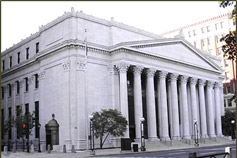Senior United States District Judge for the District of Connecticut
Staff Information

RICHARD C. LEE UNITED STATES COURTHOUSE
United States Courthouse
141 Church Street
New Haven, Connecticut 06510
Location: Courtroom 1
| Lynne Pipech | Judicial Assistant | 203-773-2428 |
| Sarah Bazir | Law Clerk | 203-773-2428 |
| Jarek Neczypor | Law Clerk | 203-773-2428 |
| Liana Barry | Courtroom Deputy | 203-773-2422 |
| Cassie Zayas | Court Reporter | 203-650-8836 |

RICHARD C. LEE UNITED STATES COURTHOUSE
United States Courthouse
141 Church Street
New Haven, Connecticut 06510
Location: Courtroom 1
| Chambers Telephone | 203-773-2428 | |
| Clerk's Office Telephone | 203-773-2140 | |
| Clerk's Office Fax | 203-773-2334 |